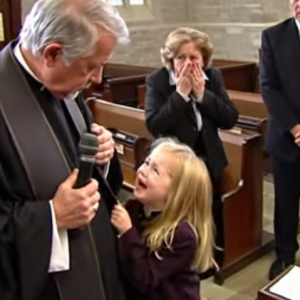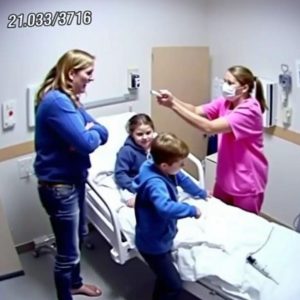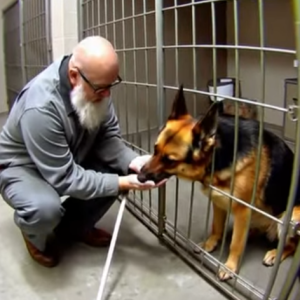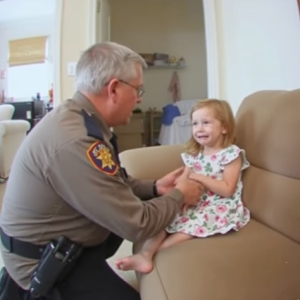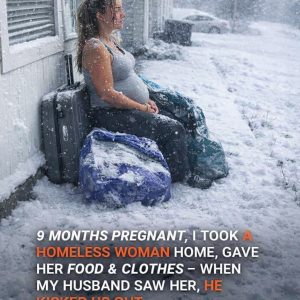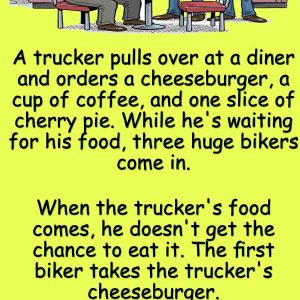Every June 4th, someone puts roses on my father’s grave. For 10 years, we wondered who left them: a secret child, a lover, or an old friend. This year, I decided to wait there and finally find out. I froze when I realized we were all wrong. It was a man I’d never seen before, walking slowly, wearing an old denim jacket and holding a single white rose in one hand and a small notebook in the other.
He didn’t notice me at first. I was standing a bit behind the big oak tree near the fence. My heart was racing. I had rehearsed so many versions of this moment in my head, but nothing prepared me for this.
He kneeled at my father’s grave, laid the rose down gently, then opened the notebook and started reading something softly. I couldn’t hear the words, but his voice trembled. There was sadness in it—real, raw sadness.
I stepped forward, and a twig cracked under my foot. He turned around, surprised, but not alarmed. His eyes, though tired, were kind.
“I’m sorry,” I said, “I didn’t mean to intrude… but I’ve been coming here every June 4th for years. I see the roses. You put them here, don’t you?”
He nodded, stood up, and wiped his hands on his jeans. “Yes. I do.”
“Did you know my father?” I asked, my voice more emotional than I expected.
He looked at me for a long second, then smiled faintly. “In a way. But not the way you think.”
I tilted my head, confused. “Were you friends?”
He looked down at the grave. “No. Your father saved my life.”
And just like that, I was stunned into silence.
He motioned for me to sit with him on the grass, and I did. He told me his name was Raul. That he grew up two towns over. That twenty years ago, he was going through the worst time of his life. He was homeless, jobless, and dealing with a serious drug problem.
“I was on the edge,” he said. “One night, I walked into your father’s hardware store, hoping to steal something I could sell. But he caught me. Instead of calling the cops… he made me a deal.”
He chuckled softly, shaking his head like he still couldn’t believe it.
“He said, ‘If you want to steal something, you can. But I think you’d rather work. I’ll pay you for a full day if you come tomorrow morning and help me unload a truck. Your choice.’”
“And you went?” I asked.
“I did. I don’t know why, but I showed up. Maybe because no one had talked to me like that in a long time. Not like I was a lost cause.”
That was the start of something. My father gave him odd jobs, small paychecks, and always made sure he left with a bag of food. No judgment. No lectures. Just quiet kindness.
“I wasn’t easy to help,” Raul admitted. “I stole from him once. He knew it. I came back the next day ready to be yelled at, but he just handed me a sandwich and asked if I wanted to talk.”
Over time, Raul started turning his life around. My father found him a place to stay—an old shed behind the shop that he converted into a livable space. Eventually, Raul got clean, found steady work, and even reconnected with his daughter.
“He changed everything for me,” he said, his eyes watery now. “And he never asked for anything in return.”
I was speechless. My father was always kind, but he never told us this story. Never mentioned Raul.
“Why the roses?” I asked.
“He used to say that white roses meant new beginnings,” Raul said. “Every year, I bring one to thank him. For giving me mine.”
We sat there in silence for a while. It wasn’t awkward. It felt… peaceful.
“I wish I had known this side of him,” I said quietly. “I mean, I always loved him, but… this is something else.”
Raul smiled. “You did know him. Just in a different way. He loved you a lot. He talked about you all the time. Showed me pictures. Said you were his greatest pride.”
I felt tears sting my eyes.
That day changed how I saw my father—and strangers.
But the story didn’t end there.
A few weeks later, I called Raul and asked if he’d like to come over for dinner. I wanted my family to meet him. My wife was hesitant at first—understandably—but once she heard the full story, she agreed.
Raul came over, wearing the same denim jacket, but this time he brought flowers for my wife and a box of chocolates for our daughter. He was nervous, but respectful, warm, and gentle.
By the end of the night, he was playing board games with the kids and telling jokes like an old friend.
He became a regular part of our lives after that. We invited him to birthdays, holidays, even barbecues. He always brought something—usually something small but thoughtful. And he always helped clean up.
My neighbors were curious, of course. Some raised eyebrows when they saw us with him. One even pulled me aside and said, “You’re really trusting that guy?”
But I just smiled. “My dad did.”
Raul never asked for money. He never overstepped. He just… showed up.
One day, I got curious and asked him about his daughter. He got quiet, then said she lived in another state and that things were still complicated between them. He didn’t push.
Later that year, I got a call from Raul. He was crying. His daughter had reached out. She wanted to visit. She was bringing her son—Raul’s grandson—who he had never met.
“Do you think I’m ready?” he asked me.
I laughed. “You’ve been ready for a long time.”
The reunion was beautiful. Awkward at first, sure, but it warmed up quickly. His daughter, Maya, told me that she had always been angry. That when he left, she felt abandoned. But over the years, she’d started hearing from people in her hometown—how her father was helping at the food bank, speaking at recovery groups, volunteering.
“I started realizing he wasn’t the man who left,” she said. “He’d changed.”
The day they left, Raul hugged me like a brother. “I owe this to your dad,” he said. “And now… to you too.”
But life is funny.
One morning, about six months later, Raul didn’t answer his phone. I thought maybe he’d gone on a trip or lost his charger again—he was terrible with technology.
But that afternoon, I got a call from the hospital. Raul had collapsed while volunteering at the community center. He was gone. Heart failure. Quick. Peaceful.
I was crushed.
We buried him next to my father. It felt right.
At the funeral, people I had never seen showed up. A dozen at least. All sharing stories about how Raul helped them. Paid for groceries. Got them into rehab. Listened when no one else would.
Turns out, he’d become his own version of my dad. Quietly helping, never asking for anything back.
After the service, Maya hugged me tightly and whispered, “Thank you for giving me my dad back.”
But that’s not the twist.
Two weeks after the funeral, I received a letter. Handwritten. From Raul.
He’d left it with Maya, with instructions to give it to me if anything ever happened to him.
Inside was a note. Simple. Honest.
“I know I can never repay what your father did for me. But I hope I honored it by helping others. And I hope I honored it by loving your family like my own. If you’re reading this, it means I’m gone. But I want you to know something: I left everything I had—my little savings, the trailer, the guitar, even my books—to you and your kids. I know it’s not much. But it’s yours now. Keep it going.”
I couldn’t stop crying.
I went to visit his trailer the next day. It was small but cozy. Photos of our family on the fridge. Notes from Maya and drawings from his grandson on the walls.
In the corner was his notebook. The same one he brought that day to my father’s grave.
Inside were letters. Dozens. To people he’d helped. People he was still helping. Even a few he hoped to help one day.
He’d written: “Kindness doesn’t need credit. But it does need consistency.”
That line stuck with me.
So now, every June 4th, we lay down two roses. One for my father. One for Raul.
My daughter, who’s now old enough to understand, helps me pick them out.
We talk about both men. One who saved a stranger. One who became family.
And every year, I tell her the same thing: “Your grandpa helped one man. That man helped dozens. And now, it’s our turn.”
Life has a way of circling back. What you give, you get. Not always in the same form, but in value.
If someone ever tells you small acts of kindness don’t matter, tell them this story.
And remember: the people who seem farthest gone are sometimes the ones closest to coming back.
If this story touched your heart, please share it. Let others know that kindness still matters. And if you’ve ever been helped—or helped someone—drop a ❤️ in the comments.
